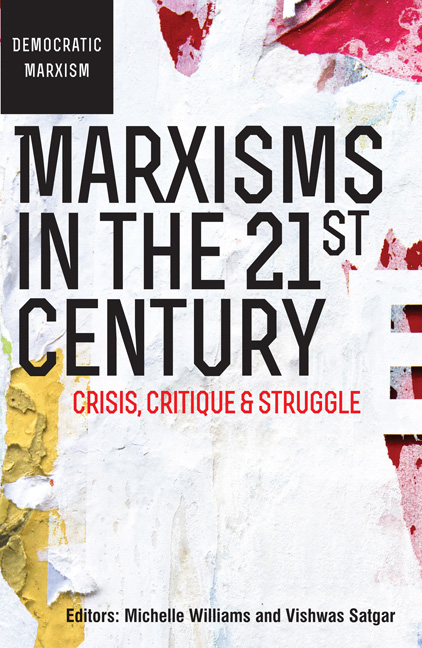Book contents
- Frontmatter
- Miscellaneous Frontmatter
- Acknowledgements
- Contents
- Acronyms and Abbreviations
- Introduction
- PART ONE DEMOCRATISING AND GLOBALISING MARXISM
- PART TWO MARXISM AND LEFT POLITICS
- PART THREE CRISES OF MARXISM IN AFRICA AND POSSIBILITIES FOR THE FUTURE
- Chapter 7 Retrospect: Seven theses about Africa's Marxist regimes
- Chapter 8 Socialism and Southern Africa
- Chapter 9 Uneven and combined Marxism within South Africa's urban social movements
- Chapter 10 Critical reflections on the crisis and limits of ANC ‘Marxism’
- Conclusion
- Contributors
- Index
Chapter 7 - Retrospect: Seven theses about Africa's Marxist regimes
from PART THREE - CRISES OF MARXISM IN AFRICA AND POSSIBILITIES FOR THE FUTURE
Published online by Cambridge University Press: 21 April 2018
- Frontmatter
- Miscellaneous Frontmatter
- Acknowledgements
- Contents
- Acronyms and Abbreviations
- Introduction
- PART ONE DEMOCRATISING AND GLOBALISING MARXISM
- PART TWO MARXISM AND LEFT POLITICS
- PART THREE CRISES OF MARXISM IN AFRICA AND POSSIBILITIES FOR THE FUTURE
- Chapter 7 Retrospect: Seven theses about Africa's Marxist regimes
- Chapter 8 Socialism and Southern Africa
- Chapter 9 Uneven and combined Marxism within South Africa's urban social movements
- Chapter 10 Critical reflections on the crisis and limits of ANC ‘Marxism’
- Conclusion
- Contributors
- Index
Summary
Africa joined three other continents in the twentieth century's experiment in Marxist–Leninist governance. The first African regimes to claim Marxism as one source of inspiration were established in the late 1950s with the commencement of the European decolonisation of Africa, some forty years after Russia's October Revolution. The first orthodox Marxist–Leninist regimes appeared in the early 1960s, with the orthodox tide cresting in the mid- to late 1970s. The Marxist– Leninist regimes dissolved at the beginning of the 1990s, their dissolution by then just one moment in the global ‘collapse of communism’. These regimes are of enduring historical interest, but their experience also yields lessons for those seeking a progressive or egalitarian way forward for twenty-first-century Africa.
The experience of Marxist–Leninist governance was disastrous by virtually any defensible metric. The lessons it offers for contemporary social democrats and democratic socialists are thus largely negative. New generations of activists and intellectuals in South Africa and elsewhere often seem too ready to forget or deny these in their rush to embrace slogans, concepts and iconography reminiscent of authoritarian rather than democratic socialism.
Bearing in mind both the historical interest value of Africa's Marxist regimes and the need, more than two decades after their demise, to learn what we can from their failures, I offer below seven theses about Africa's Marxist–Leninist governments and the movements undergirding them.
The theses refer to the doctrines and practices of parties, movements and political currents that claimed to be Marxist and were guided to a significant degree by particular interpretations of Marxist theory. The chapter does not address academic Marxism, and it sidesteps the question of whether these regimes were ‘truly’ Marxist, whether they correctly interpreted the canon or indeed whether it constitutes a category error to refer to a regime as Marxist (as opposed to, say, popular-democratic or socialist). I do, however, conclude with some critical comments on Marxist theory as such and take the view that Marxist theory is probably implicated, along with other factors, in the failure of the ‘Marxist regimes’.
THESIS ONE
There was no clear qualitative difference between the levels of radicalism displayed by the Marxist–Leninist regimes and the preceding African socialist ones.
- Type
- Chapter
- Information
- Marxisms in the 21st CenturyCrisis, Critique & Struggle, pp. 168 - 195Publisher: Wits University PressPrint publication year: 2013



